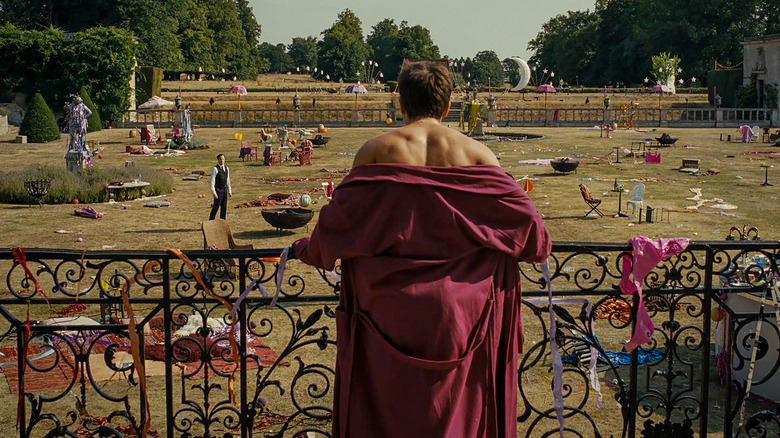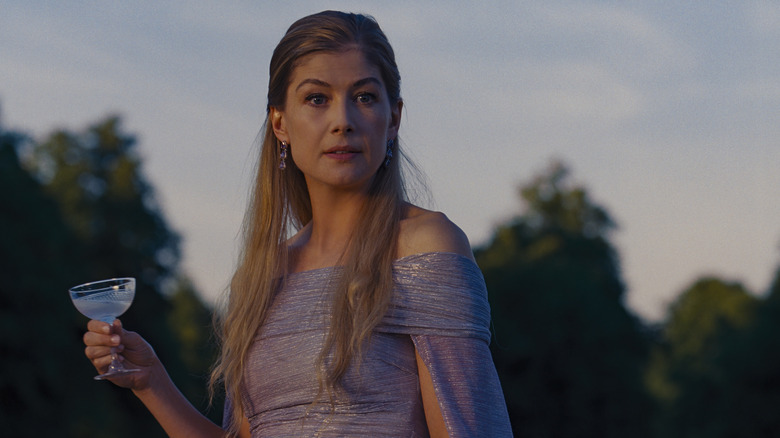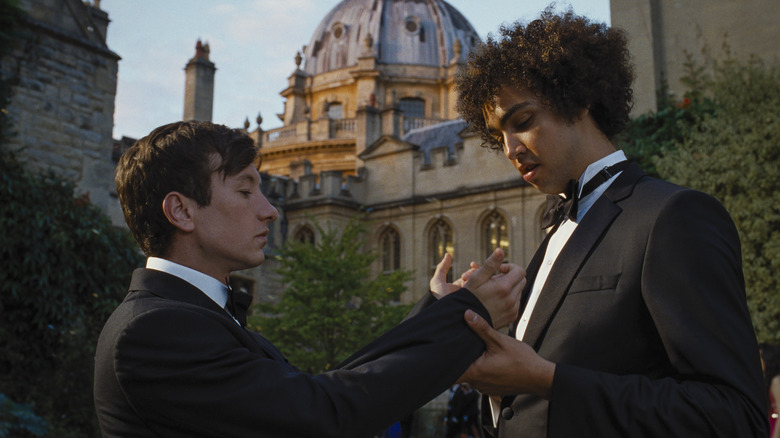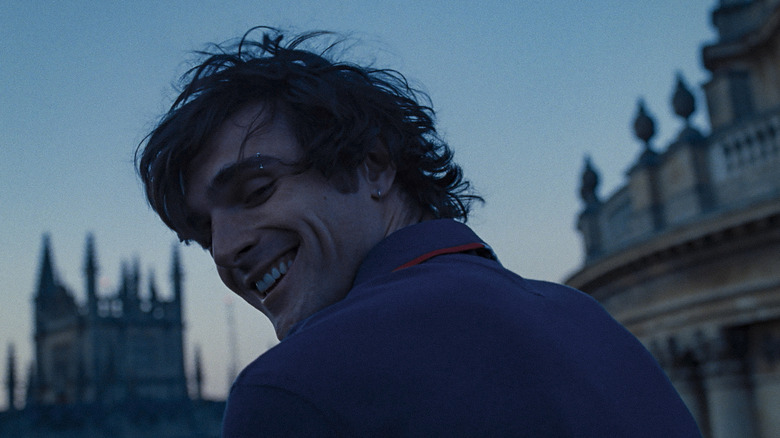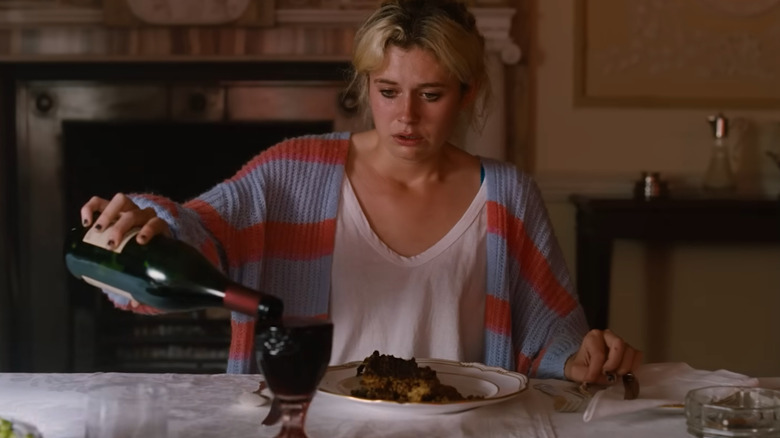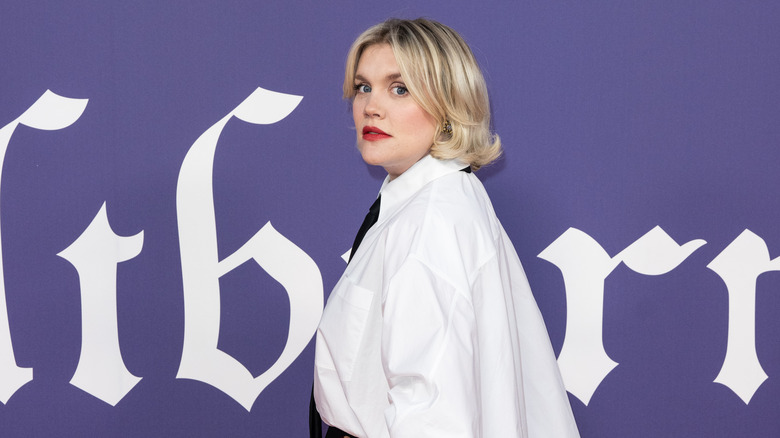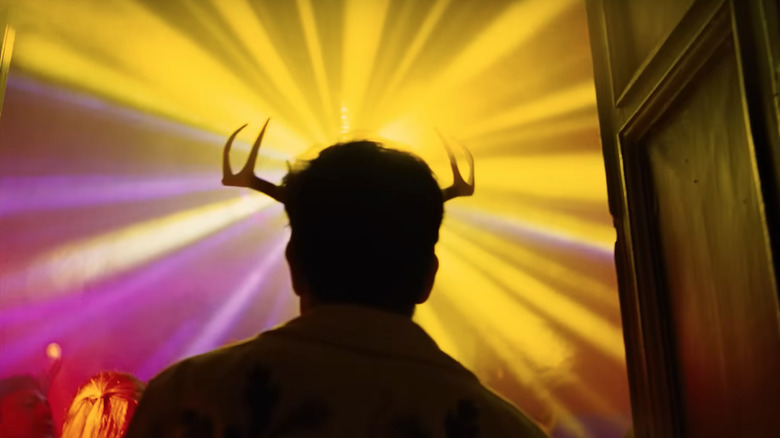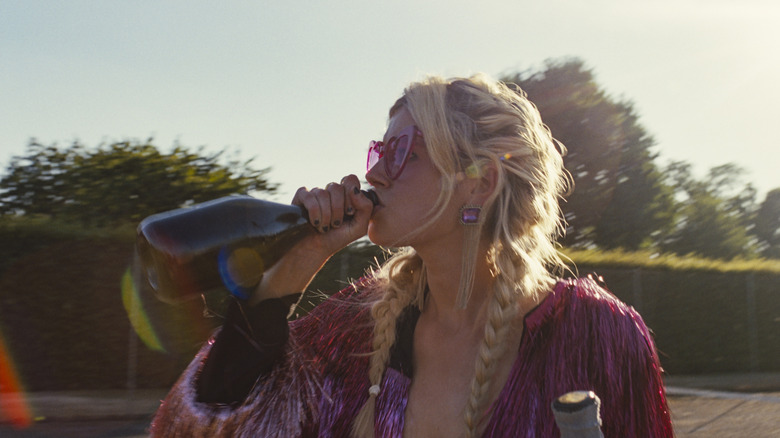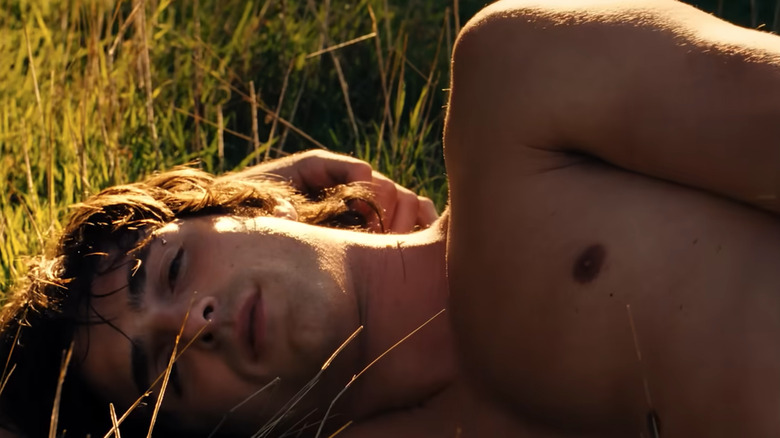The Ending Of Saltburn Explained
This article contains spoilers for "Saltburn."
Writer-director Emerald Fennell knows how to play around with audience expectations. "Saltburn," Fennell's follow-up to her Oscar-winning debut film "Promising Young Woman," delivers another ending that's twisted by both definitions of the word. Among the big movies of fall 2023, this might be one that leaves viewers scratching their heads the most trying to make sense of what they just watched.
This confusion won't be due to the plot itself – the specific events are clearly presented and easy to follow. Instead, it's the questions about what the story means – or if it means anything at all – that will cause the most discussion and debate. "Saltburn" touches upon big themes of privilege, envy, love, loss, and obsession, but it handles these themes with a sense of ambiguity rather than delivering direct statements. On top of all that, it's filled with moments engineered for the purposes of shock and disgust. If you need help processing everything that goes on in the psychosexual thriller's final act, this article will examine the movie's conclusion from multiple different perspectives.
What you need to remember about the plot of Saltburn
"Saltburn" opens in the present day circa 2023, with Oliver Quick (Barry Keoghan) reflecting on his relationship with Felix Catton (Jacob Elordi) before flashing back to when the two first met at Oxford in 2006. Like most students at the university, Felix comes from wealth, whereas Oliver is one of the few students there on scholarship. Supposedly Oliver's alcoholic father has passed away and Oliver has no interest in coming home to his drug-addicted mother. Feeling bad for his new friend, Felix invites Oliver to spend the summer at Saltburn, his family's lavish estate.
At Saltburn, Oliver is introduced to Felix's family: Absent-minded father Sir James (Richard E. Grant), "ugliness"-fearing mother Elspeth (Rosamund Pike) and depressed anorexic sister Venetia (Alison Oliver). Then there's one family member to whom Oliver needs no introduction: Felix's cousin Farleigh Start (Archie Madekwe) a biracial American who's desperate to cling to his British family's status and already has an antagonistic relationship with Oliver at school. Oliver is obsessed with Felix – like, bathwater-drinking obsessed – and when Venetia and Farleigh both try to make it clear to him that Felix just sees him as a temporary "toy" to play with, Oliver responds by messing with both of them in perverse ways.
What happened at the end of Saltburn?
In the final act of the film, the Catton family has prepared a big birthday bash for Oliver themed around "A Midsummer Night's Dream," but Felix has become wise to Oliver's manipulations. The morning before the party, Felix takes Oliver on a "surprise road trip" – to Oliver's parents' house. Contrary to Oliver's sob stories, both of his parents are alive, friendly, middle class, and seemingly not addicts. At the party, Felix doesn't want to be anywhere near Oliver — though Oliver tracks him down in Saltburn's labyrinth to declare his love.
After the party, Felix's body is found dead in the labyrinth. Sir James and Elspeth try to act like everything's okay, but Venetia and Farleigh can't keep up the ridiculous facade. After the funeral, Oliver essentially has sex with Felix's grave. Not long after her brother's death, Venetia commits suicide, and while Elspeth wants to keep Oliver around, Sir James wants to pay Oliver to leave Saltburn.
Years pass, and the film brings us back to the present day. Sir James dies, seemingly of natural causes, and an older Oliver reunites with Elspeth. She welcomes him back to Saltburn with open arms – but sure enough, she has enough "accidents" to end up on life support. It's revealed that Oliver's opening narration was being delivered to Elspeth. Oliver confesses that he killed Felix by poisoning his drink before ripping away Elspeth's life support. With the whole Catton family destroyed, Saltburn is now in Oliver's possession. He celebrates with cocaine and naked dancing around the building.
What is the ending saying about class?
The premise of "Saltburn" makes it seem easy to compare it to the recent wave of dark satires about the haves and have-nots, a la "Parasite" or "The Menu." Yet while "Saltburn" finds stuff to laugh about in the eccentric foibles and uncomfortably callous attitudes of the ultra-wealthy Cattons, its attitude towards the upper class feels a lot less vicious than other films of this type because its ultimate villain isn't a rich person or a greater systemic force; rather, it's Oliver, the middle-class interloper.
Whatever sympathy Oliver might initially engender as an outsider is lost due to both his twisted actions and lack of psychological relatability. If we're reading "Saltburn" as a commentary on class, the fact that Oliver lies about being poor and struggling when he really has a middle-class home life and is simply envious of those who have more than he does might even come across as a reactionary message. As such, perhaps it's better to not view Oliver as representative of his socioeconomic background. Nonetheless, some critics have still described the film as an "eat the rich" movie – even if Oliver comes off as more sociopathic than his wealthy hosts, people can still find enjoyment in seeing Oliver slowly destroy those silly out-of-touch Cattons and claim Saltburn for himself.
How Saltburn might read differently in England than it does in America
It's important to acknowledge that "Saltburn" takes place in England, where issues of class are treated differently than they are in America. Whereas American capitalism is based around the semi-mythical idea of "the American dream" where anyone from any background can make it big if they work hard enough, British class structures are treated far more rigidly with a much more "know your place" attitude. This is particularly visible in institutions like Oxford, where a scholarship student like Oliver completely sticks out.
In that cultural context, it's possible there's greater catharsis and even empowerment for Brits in seeing Oliver find ways to rise above his station, no matter how twisted. In America, however, "you too can get rich with a little patience and hard work (and maybe crime)" stories are our cultural bread and butter, so this aspect of the film plays a bit more basic and less richly satisfying here.
On this topic, it's worth noting how "Saltburn" acknowledges this culture clash through the American character of Farleigh. One of the more complex supporting characters in the film, Farleigh bullies Oliver to assert his connections to privilege within the British class structure, but Farleigh's position is very much conditional — his hyper-privileged family still treats him as an outsider. There's no doubt this is due to his biracial status — if class hierarchies are slightly less ingrained in the American psyche, racial hierarchies are fixed in place on both sides of the Atlantic.
Did Oliver love Felix?
If class analysis isn't the best perspective to dig into "Saltburn," perhaps it's better to focus on the main source of character drama: Oliver's feelings for Felix. In the film's opening narration, Oliver claims he "loved" Felix but wasn't "in love." Both Oliver and Felix talk of "love" for each other throughout the film, which in Oliver's case at least goes beyond seeing each other as good friends and into a clear homoerotic sexual fixation. In the end, Oliver declares he actually "hated" Felix – which sounds like a contradiction, but it's very possible he could have both loved and hated the same person.
Of course, there's much to debate over what exactly Oliver considers "love." He comes across as a complete sociopath, lacking empathy towards others and having zero conniptions about cruelly manipulating and hurting people, so he may very well be incapable of "love" as traditionally defined. Whether or not his feelings can be accurately called "love," however, he's certainly filled with passion and obsession. His obsession with Felix is partially based in sexual attraction, but beyond that, it seems to be based primarily in envy. Oliver wants what Felix has: His social status, his wealth, and his effortless ability to charm everyone around him. In the end, Oliver is able to take all of Felix's former belongings, but gaining Felix's personal strengths is another matter entirely.
The film's most moving moment
With the psychological inscrutability of its protagonist, "Saltburn" aims more for general shock and intrigue rather than trying to build deeper connections with the characters. Even so, there is one scene towards the end of the film that stands out for letting more genuine emotion enter the picture in a way that doubles as the film's most pointed joke about the British upper class. It's the scene after Felix has been found dead, and Sir James and Elspeth still refuse to let go of their preexisting plans despite their son's death.
Gathered at the dining room table, the parents just want to talk about how great Oliver's birthday party was while eating meat pies. In contrast, Farleigh and Venetia – the two most genuinely sympathetic characters – react to the death with actual tears. When Farleigh tries to talk about how absurd and cruel it is to act as if nothing happened, the parents respond with orders to "eat the bloody pie" and the claim that "no one wants to hear about your bloody American feelings." The parents represent the stiff upper lip, "keep calm and carry on" attitude taken to a comically unhealthy extreme. Even outside the specific cultural context, this scene hits awfully hard for the universal relatability of the struggle to pretend things are normal in the face of tragedy.
What has director Emerald Fennell said about the ending?
Given the conscious need to avoid spoilers about the film's many twists, the cast and crew of "Saltburn" haven't spoken directly about the film's ending as of this writing. Nonetheless, Emerald Fennell's comments on the general themes of the film may be helpful in trying to process the film's ending, as well as which themes she doesn't want to comment on.
When speaking to Vogue, the filmmaker avoided answering questions about the way the film addresses racism, sexism, and classism, deeming these political issues secondary to her actual main focus. "Really, it's a film about first love," she said. "Generally, because I'm quite facile, I think everything has to do with sex, and I think our fetishization of the country house and titles is completely sadomasochistic... I'm utterly obsessed with how we relate to things that we want and desire and also kind of hate and know are unattainable — things that we know will never love us back, whether that's a person or a house or a culture. And yet we can't f—ing stop being desperately attracted to them. My question is: why?"
Designing the birthday party
Imagery from Oliver's climactic "Midsummer Night's Dream" birthday party has been present throughout the marketing for "Saltburn," so while the dramatic events of the party are still spoiler material, the film's crew has been able to speak about the design elements of the sequence.
"There were so many design elements that we wanted to bring to the party, elements that needed to feel like they'd been in the family for years, particularly the proscenium arch, where we imagined for hundreds of years families would put on plays for their neighbors and friends," said production designer Suzie Davies in the press notes. "And then to contrast that, we talked about having the slightly grotesque pig on the spit rolling in front of it. It was all about the juxtaposition of the surreal, the sinister, and the colorful."
Costume designer Sophie Canale talked about how Oliver's antlered costume came from a desire to make him look "like something out of folklore." She contrasted the intense jewelry design of Venetia and Elspeth's costumes with Felix's lazier Puck costume: "You've got everyone else at the party in ballgowns, black tie, fancy dress, or trashy dresses. But Felix is just in his jeans and a vest, and then he's put a pair of wings on and that's all the effort he's going to make."
Speaking in the press notes before the SAG-AFTRA strike, Archie Madekwe described the dramatic effect the party has on the story: "Throughout the film, there's something of a heightened Shakespearean quality to Saltburn and the Cattons and then it all comes to life on this night."
Is Saltburn a vampire film?
Another key to understanding "Saltburn" is looking at its connections to gothic romance and horror stories. Fennell cited "The Go-Between," "Brideshead Revisited," and "Rebecca" as influences in the film's press notes. At screenings of the film, she's gone further in describing the film's horror as being akin to a vampire film.
"Certainly metaphorically it is a vampire film," The Standard reported Fennell saying at the BFI London Film Festival. "It is about what we do when we're completely besotted with something or someone. And I hope it's part of the classic Gothic tradition where love and hate are very, very close together."
Getting into somewhat spoiler-y territory after a screening at the Academy Museum in Los Angeles, Fennell went further into how the vampire metaphor applies to Oliver. Deadline paraphrased her comments about Oliver being "an outsider sucking the marrow from the life he envies." She acknowledged that the metaphor "works both ways" with the Cattons also having life-sucking qualities to them — perhaps best demonstrated in the way Elspeth treats her troubled friend "Poor Dear" Pamela (Carey Mulligan).
An intentionally divisive provocation
As reported by Gold Derby, Fennell explained her biggest goal for the film following another awards consideration screening in Los Angeles. Speaking in a Q&A moderated by Variety's Clayton Davis, she said that she wants "everyone to, you know, hate it, love it, be turned on, be freaked out... whatever it makes you feel. I want people to feel something. That's the reason you make a movie and not a TV show or write a book."
By this standard, "Saltburn" is undeniably a success. Love it or hate it, it's sure to make you feel something. It's a guaranteed controversy-bomb with at least five of the most shocking scenes of the year. What else is there to say about a movie where the main character licks his crush's bathwater from the drain; has sex with his crush's sister in a manner that might be too ... let's call it "creative" to describe on a family-friendly website; sexually assaults his crush's cousin in bed; humps the dirt over his crush's grave, and celebrates the death of a whole family while dancing naked?
Do we need to talk about the nudity?
We can't really talk thoroughly about the ending of "Saltburn" without acknowledging the elephant in the room: Barry Keoghan's penis, graphically on display in the final scene. Consider it "Chekhov's penis" – Oliver strips naked to lounge about in the grass with Felix in an earlier scene, and his anatomy is commented on but not yet seen. There's a vague side-view of penis in the dark in the grave-humping scene, and then the movie ends with full frontal.
Interestingly, Fennell told MovieMaker that she feels on-screen nudity is "about grief or triumph" as opposed to eroticism, which is why the regular sex scenes in the movie are focused mainly on the actor's faces while the actual naked moments are either about grief (the grave scene) or triumph (the ending). Between this and "Poor Things," the 2023 awards season has an unusually high quantity of dongs on screen.
If you or anyone you know has been a victim of sexual assault or are experiencing suicidal thoughts or need help with an eating disorder, contact the relevant resources below:
- Visit the Rape, Abuse & Incest National Network website or contact RAINN's National Helpline at 1-800-656-HOPE (4673).
- Call or text 988 or chat 988lifeline.org
- Visit the National Eating Disorders Association website or contact NEDA's Live Helpline at 1-800-931-2237. You can also receive 24/7 Crisis Support via text (send NEDA to 741-741).


